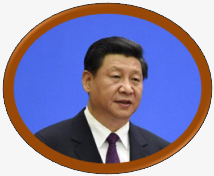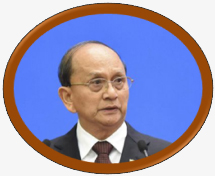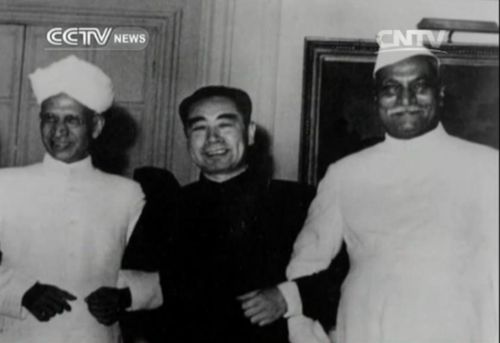China, India, Myanmar mark 60th anniversary of Peace Principles
| Latest News |
The Five Principles of Peaceful Coexistence initiated six decades ago have been enriched with the development of the times as they have become increasingly important in handling international relations.
Xi calls for global approach to securityChinese President Xi Jinping on June 28 called on countries to participate in global security on an equal footing, saying that flexing military muscle only reveals the lack of moral grounds or vision rather than reflecting one’s strength.
Five Principles of Peaceful Coexistence not outdated, Chinese presidentChinese President Xi Jinping said on June 28 that the Five Principles of Peaceful Coexistence initiated 60 years ago are not outdated, but remain as relevant and important as ever in handling international relations.
Chinese, Indian, Myanmar leaders mark 60-yr-old peace principlesChinese President Xi Jinping, Myanmar President U Thein Sein and Indian Vice President Mohammad Hamid Ansari gathered in Beijing on June 28 to mark the 60th anniversary of the Five Principles of Peaceful Coexistence.
| Commemoration Activities |
| ● On June 28, Conference Marking the 60th Anniversary of the Five Principles of Peaceful Coexistence was held in the Great Hall of the People in Beijing. | ||
| Chinese President Xi Jinping, visiting Myanmar President U Thein Sein and Indian Vice President Mohammad Hamid Ansari participated in the commemoration and delivered speeches. Also present at the commemoration were Chinese Premier Li Keqiang, top legislator Zhang Dejiang and top political advisor Yu Zhengsheng. | ||
 | "Considering the development trend and China’s fundamental interests, it is a strategic choice to stick to a peaceful development path. We Chinese people believe in the idea of, ‘Do not do to others what you do not want to be done to yourself.’ And we don’t agree that a strong country will always seek hegemony, as the Chinese people have never sought hegemony," said Chinese President Xi Jinping. | |
 | "We in Myanmar, as a co-founder, are pleased to see that the five principles have not only overcome the test of time, but have matured with time and became a norm in principles of inter-state relations," said Myanmar President Thein Sein. | |
 | Indian Vice President Mohhamod Hamid Ansari urged other countries to continue to expand the principles, and to seek common and fair solutions for challenges. "Our destinies are intertwined. Our goal is to tackle transnational threats more effectively," said Indian Vice President M. Hamid Ansari. | |
| ● On June 28, the Myanmar Foreign Ministry organized a function to commemorate the 60th anniversary of the Five Principles of Peaceful Coexistence. |
| ● On June 29, Premier Li Keqiang will accompany President U Thein Sein of Myanmar and Vice President Ansari of India for a reception and a photo exhibition. |
Source: Xinhua, CNTV, Chinese Foreign Ministry
| Comments |
Global Times: Five Principles show China’s long dedication to peace
China and other neighboring stakeholders must reach a consensus to try their best to explore effective approaches to address unnecessary conflicts.
Sixty years have passed since the Five Principles were issued, and it is high time that we all should think out of the box and figure out other ways to resolve these thorny problems. They are not the sole responsibility of China alone.
Wang Yiwei, director of the Institute of International Affairs, Renmin University of China:
There are three benefits to commemorating the 60th anniversary of the peace principles. It unites developing countries in maintaining the post-World War II order as initially advocated by China, India and Myanmar, while making great diplomatic contributions to developing countries. As the cornerstone of China’s periphery diplomacy, it has also improved China’s relations with surrounding nations. Finally, it enables China to garner positive public opinion internationally as new situations arise.
Dr. Joseph Matthews, the director of International Cooperation Department at the Asia Euro University in Phnom Penh:
"China's policy of non-interference in the internal affairs of other countries has won the hearts and minds of third world and developing countries around the globe, and especially in sub- Sahara Africa and South America, where most of the poor countries are located.
"Whether it is South China Sea or East China Sea maritime dispute, it should be resolved bilaterally and without the interference of a third, non-regional player."
Dr. Chheang Vannarith, a senior researcher of the Cambodian Institute for Cooperation and Peace:
"China, India and Myanmar are the pioneers in initiating such principle of international relations, they should further develop such concept in the new context of a fast-changing world," he said.
Rahmat Bin Mohamad, secretary general of the Asian-African Legal Consultative Organization:
Rahmat Bin Mohamad said while the Five Principles were raised to respond to imperialism, colonialism and hegemony six decades ago, their spirit needs to be revitalized today to ensure that the Asian-African community continues to contribute to developing international law.
| Photos |
| About the Peace Principles |

Photo: CNTV
The Five Principles of Peaceful Co-existence were proposed by late Chinese premier Zhou Enlai in 1954. They are: mutual respect for sovereignty and territorial integrity, mutual non-aggression, non- interference in each other’s internal affairs, equality and mutual benefit, and peaceful co-existence.In 1954, China and India signed an Agreement on Trade and Communications between China’s Tibet and India. It was in this document that the Five Principles were codified for the first time.
Premier Zhou then visited India and Myanmar in 1954, and issued joint declarations with the two countries. The five principles were established as the basic norms governing China’s relations with each of the two countries.
Source: CNTV
For more, please click: History of 'Five Principles of Peaceful Co-existence'
Web editor: guwei@globaltimes.com.cn





